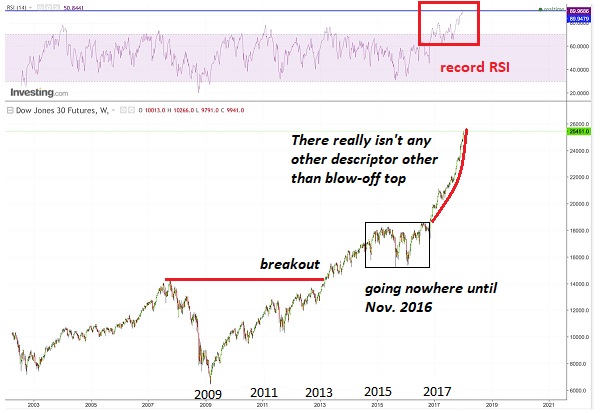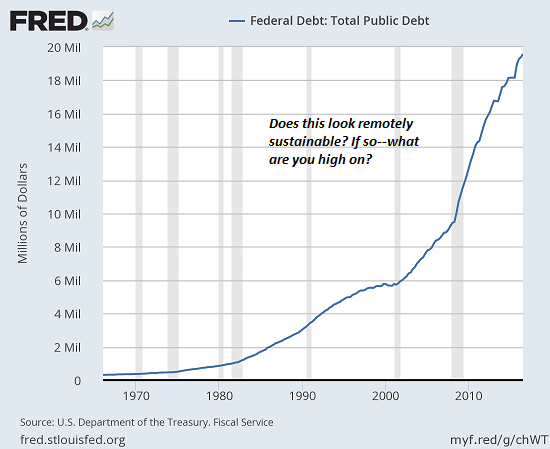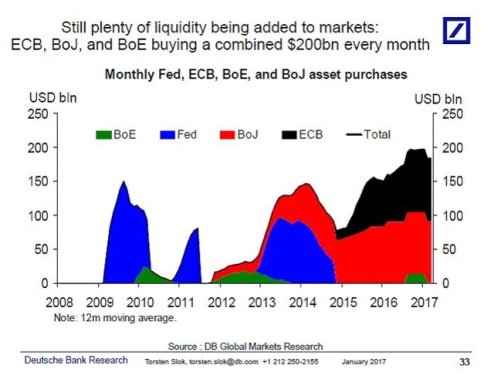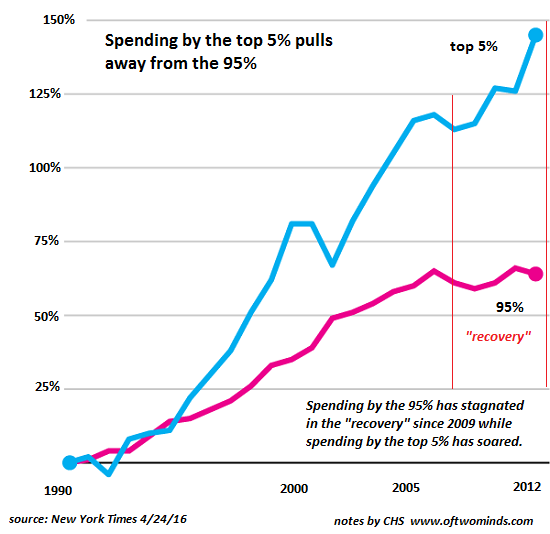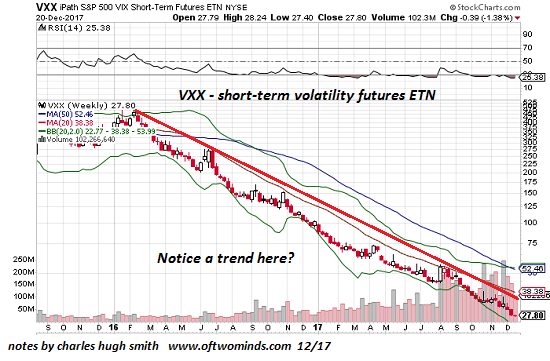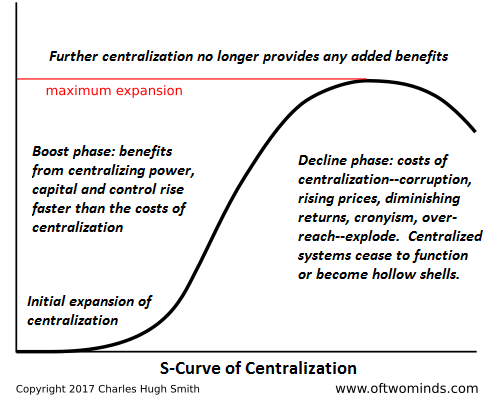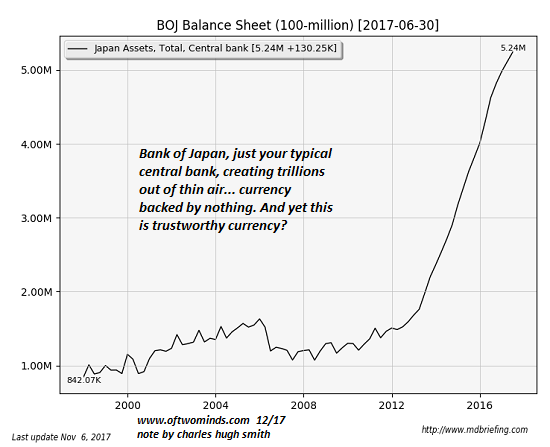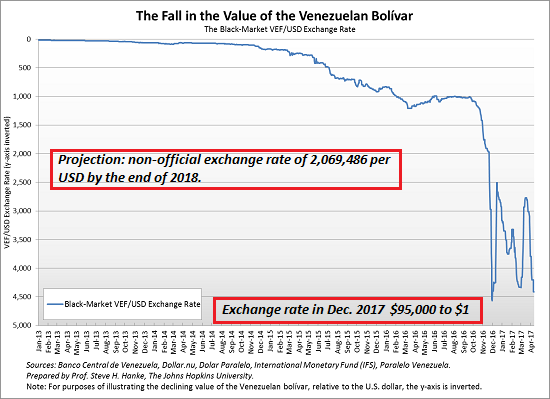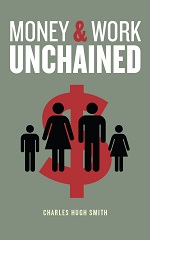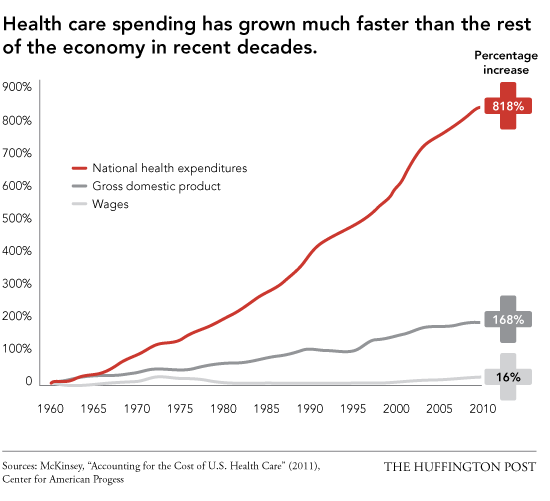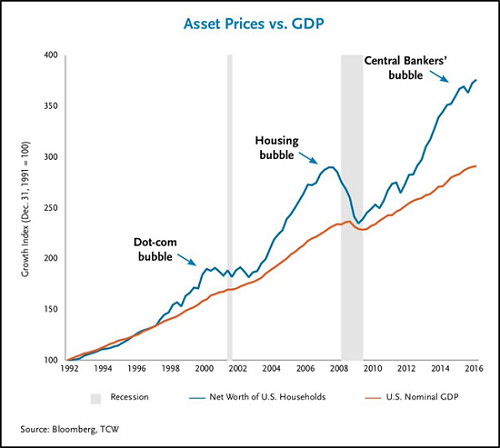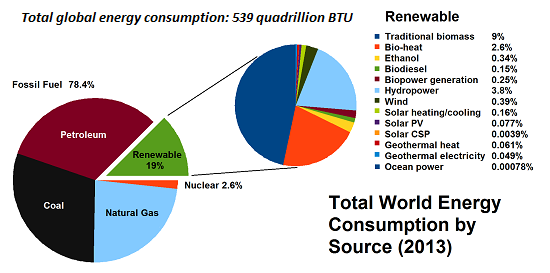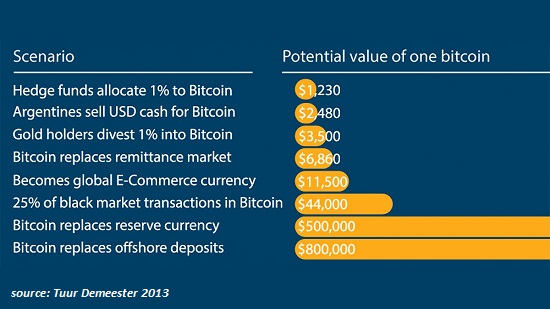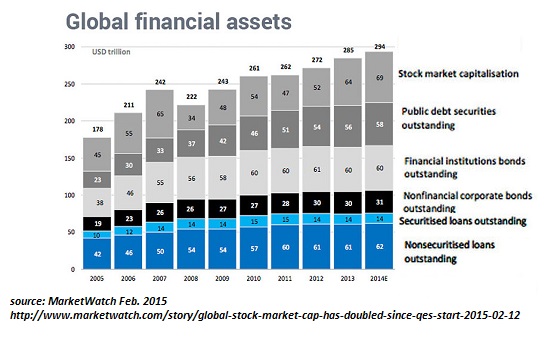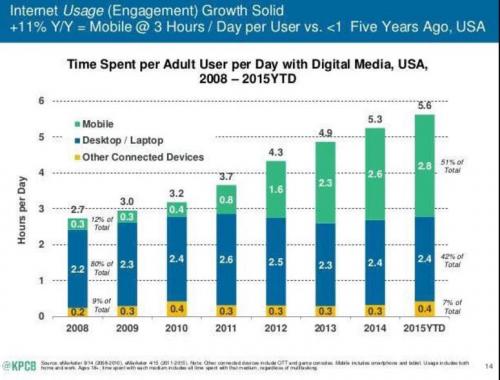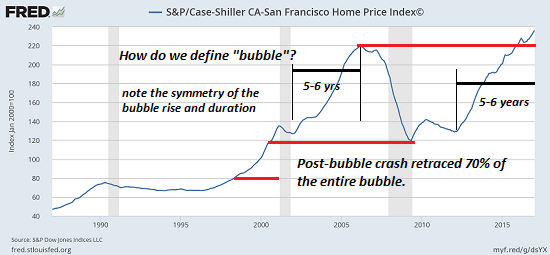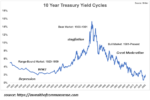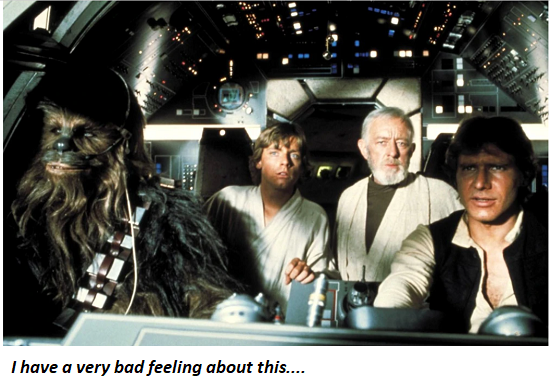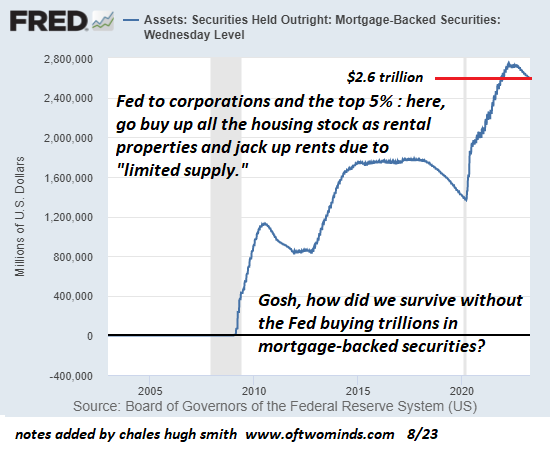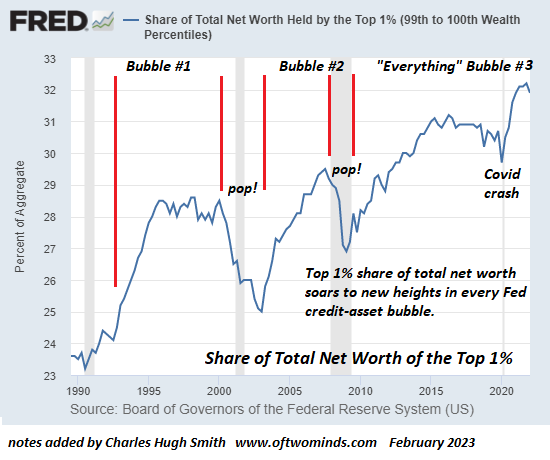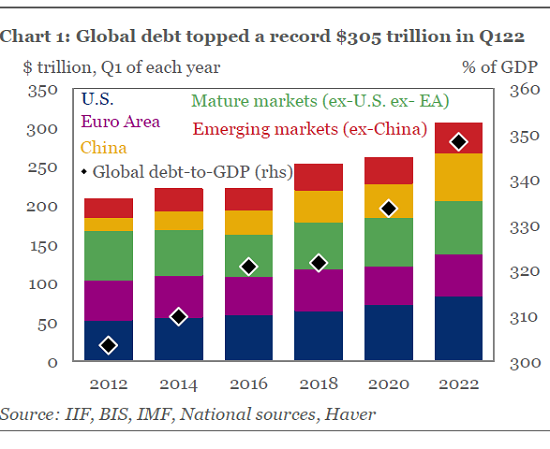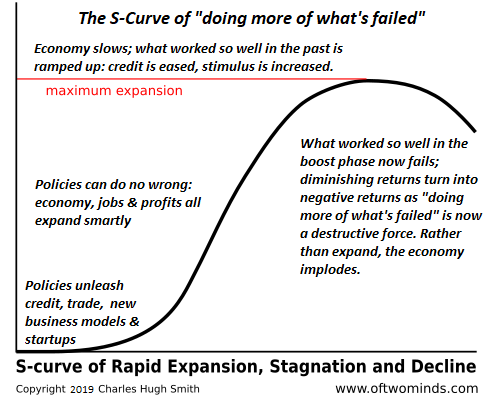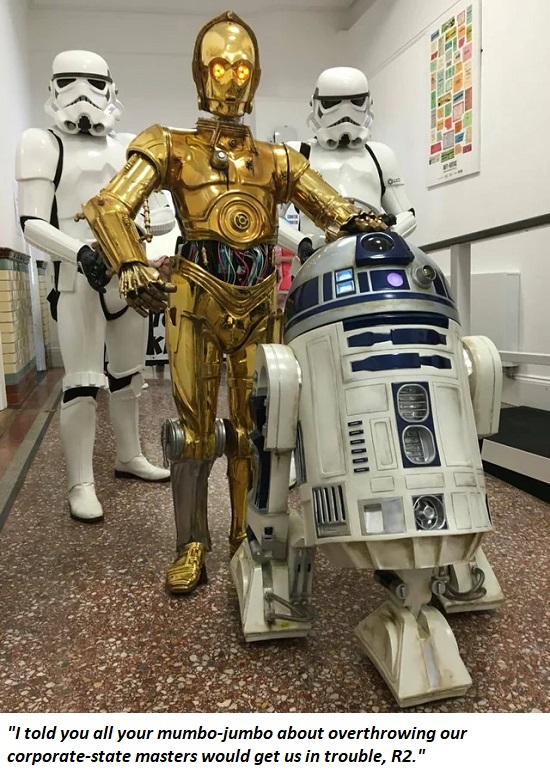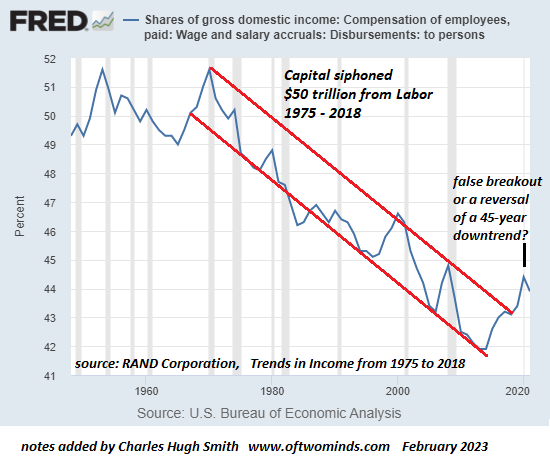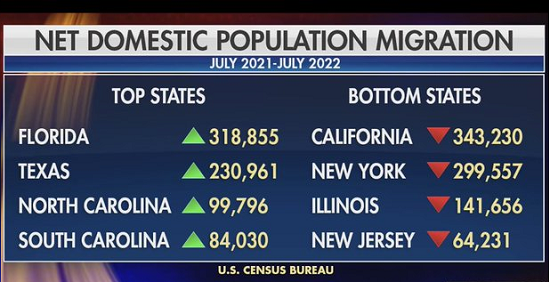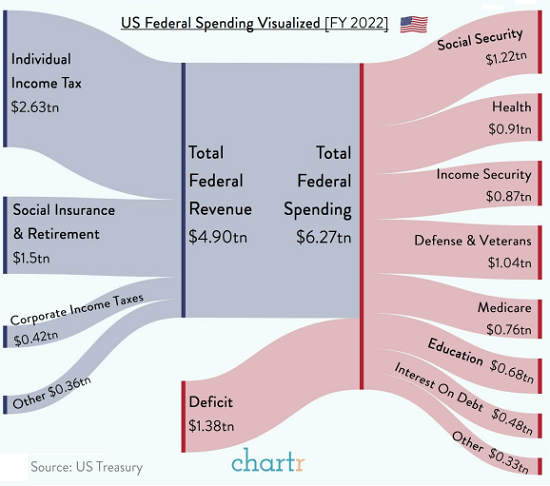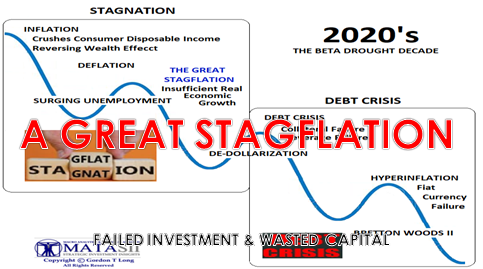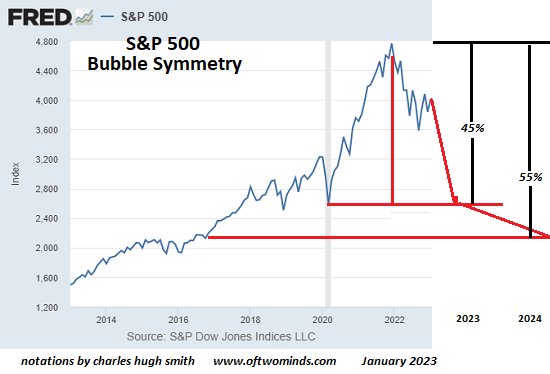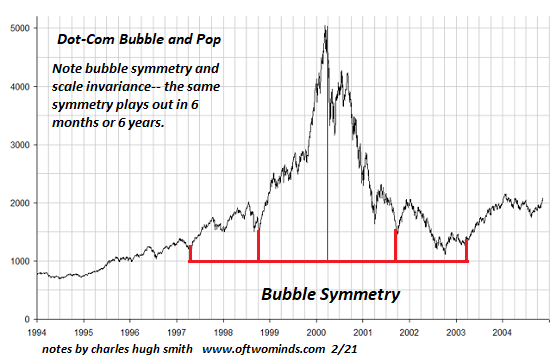Category Archive: 5.) Charles Hugh Smith
It’s Time to Retire “Capitalism”
Our current socio-economic system is nothing but the application of force on the many to enforce the skims, scams and privileges of the self-serving few. I've placed the word capitalism in quotation marks to reflect the reality that this word now covers a wide spectrum of economic activities, very little of which is actually capitalism as classically defined.
Read More »
Read More »
The Fascinating Psychology of Blowoff Tops
The psychology of blowoff tops in asset bubbles is fascinating: let's start with the first requirement of a move qualifying as a blowoff top, which is the vast majority of participants deny the move is a blowoff top.
Read More »
Read More »
Yes, But at What Cost?
This is how our entire status quo maintains the illusion of normalcy: by avoiding a full accounting of the costs. The economy's going great--but at what cost? "Normalcy" has been restored, but at what cost? Profits are soaring, but at what cost? Our pain is being reduced--but at what cost? The status quo delights in celebrating gains, but the costs required to generate those gains are ignored for one simple reason: the costs exceed the gains by a...
Read More »
Read More »
Why the Financial System Will Break: You Can’t “Normalize” Markets that Depend on Extreme Monetary Stimulus
Central banks are now trapped. In a nutshell, central banks are promising to "normalize" their monetary policy extremes in 2018. Nice, but there's a problem: you can't "normalize" markets that are now entirely dependent on extremes of monetary stimulus. Attempts to "normalize" will break the markets and the financial system. Let's start with the core dynamic of the global economy and nosebleed-valuation markets: credit.
Read More »
Read More »
The Hidden-in-Plain-Sight Mechanism of the Super-Wealthy: Money-Laundering 2.0
Financial and political power are two sides of one coin. We all know the rich are getting richer, and the super-rich are getting super-richer. This reality is illustrated in the chart of income gains, the vast majority of which have flowed to the top .01%--not the top 1%, or the top .1% -- to the very tippy top of the wealth-power pyramid.
Read More »
Read More »
“Wealth Effect” = Widening Wealth Inequality
Note that widening wealth and income inequality is a non-partisan trend. One of the core goals of the Federal Reserve's monetary policies of the past 9 years is to generate the "wealth effect": by pushing the valuations of stocks and bonds higher, American households will feel wealthier, and hence be more willing to borrow and spend, even if they didn't actually reap any gains by selling stocks and bonds that gained value.
Read More »
Read More »
Christmas 2017: Why I’m Hopeful
A more human world lies just beyond the edge of the Status Quo. Readers often ask me to post something hopeful, and I understand why: doom-and-gloom gets tiresome. Human beings need hope just as they need oxygen, and the destruction of the Status Quo via over-reach and internal contradictions doesn't leave much to be happy about.
Read More »
Read More »
Santa’s Stock Market Rally: Tears of Joy, Or Just Tears?
Judging by this year's version of Santa Claus's reliable year-end stock market rally, risk has vanished, not just in stocks but in bonds, junk bonds, housing, commercial real estate, collectible art--just about the entire spectrum of tradable assets (with precious metals and agricultural commodities among the few receiving coals rather than rallies).
Read More »
Read More »
Regulating Cryptocurrencies–and Why It Matters
Nations that attempt to limit cryptocurrencies' ability to solve these problems will find that protecting high costs and systemic friction will grind their economies into dust. There's a great deal of confusion right now about the regulation of cryptocurrencies such as bitcoin. Many observers seem to confuse "regulation" and "banning bitcoin," as if regulation amounts to outlawing bitcoin.
Read More »
Read More »
Could Central Banks Dump Gold in Favor of Bitcoin?
All of which brings us to the "crazy" idea of backing fiat currencies with cryptocurrencies, an idea I first floated back in 2013, long before the current crypto-craze emerged. Exhibit One: here's your typical central bank, creating trillions of units of currency every year, backed by nothing but trust in the authority of the government, created at the whim of a handful of people in a room and distributed to their cronies, or at the behest of their...
Read More »
Read More »
Bitcoin vs Fiat Currency: Which Fails First?
What if bitcoin is a reflection of trust in the future value of fiat currencies? I am struck by the mainstream confidence that bitcoin is a fraud/fad that will soon collapse, while central bank fiat currencies are presumed to be rock-solid and without risk. Those with supreme confidence in fiat currencies might want to look at a chart of Venezuela's fiat currency, which has declined from 10 to the US dollar in 2012 to 5,000 to the USD earlier this...
Read More »
Read More »
A Radical Critique of Universal Basic Income
This critique reveals the unintended consequences of UBI. Readers have been asking me what I thought of Universal Basic Income (UBI) as the solution to the systemic problem of jobs being replaced by automation.To answer this question, I realized I had to start by taking a fresh look at work and its role in human life and society. And since UBI is fundamentally a distribution of money, I also needed to take a fresh look at our system of money.
Read More »
Read More »
What Is Money? (Yes, We’re Talking About Bitcoin)
What is money? We all assume we know, because money is a commonplace feature of everyday life. Money is what we earn and exchange for goods and services. Everyone thinks the money they’re familiar with is the only possible system of money—until they run across an entirely different system of money.
Read More »
Read More »
The Cost Basis of our Economy is Spiraling Out of Control
What will it take to radically reduce the cost basis of our economy? If we had to choose one "big picture" reason why the vast majority of households are losing ground, it would either be the stagnation of income or the spiraling out of control cost basis of our economy, that is, the essential foundational expenses of households, government and enterprise.
Read More »
Read More »
Stock Market 2018: The Tao vs. Central Banks
The central banks claim omnipotent financial powers, and their comeuppance is overdue. will be the first to admit that invoking the woo-woo of the Tao as the reason to expect a reversal of the stock market in 2018 smacks of Bearish desperation. With everything coming up roses in much of the global economy, there is precious little foundation for calling a tumultuous end to the global Bull Market other than variations of nothing lasts forever.
Read More »
Read More »
Did Anyone Do Even a Minimal Check on the Sensationalist Bitcoin Electrical Consumption Story?
Check the context before uncritically accepting sensationalist conclusions. Let's start with a primer on how to write a sensationalist story that can be passed off as "journalism:" 1. Locate credible-sounding data that can be de-contextualized, i.e. sensationalized. 2. Present the data as "fact" rather than data that requires verification by disinterested researchers.
Read More »
Read More »
My Crazy $17,000 Target for Bitcoin Is Looking Less Crazy
The basis of this admittedly crazy forecast was simple: capital flows. I think we can all agree that bitcoin (BTC) is "interesting." One of the primary reason that bitcoin (and cryptocurrency in general) is interesting is that nobody knows what will happen going forward. Unknowns and big swings up and down are characteristics of open markets.It's impossible to forecast bitcoin's future price because virtually all the future inputs are unknown.
Read More »
Read More »
The Asymmetry of Bubbles: the Status Quo and Bitcoin
Regardless of one's own views about bitcoin/cryptocurrency, what is truly remarkable is the asymmetry that is applied to questioning the status quo and bitcoin. As I noted yesterday, everyone seems just fine with throwing away $20 billion in electricity annually in the U.S. alone to keep hundreds of millions of gadgets in stand-by mode, but the electrical consumption of bitcoin is "shocking," "ridiculous," etc.
Read More »
Read More »
Addictions: Social Media & Mobile Phones Fall From Grace
Identifying social media and mobile phones as addictive is only the first step in a much more complex investigation. For everyone who remembers the Early Days of social media and mobile phones, it's been quite a ride from My Space and awkward texting on tiny screens to the current alarm over the addictive nature of social media and mobile telephony.
Read More »
Read More »
Beware the Marginal Buyer, Borrower and Renter
When times are good, the impact of the marginal buyer, borrower and renter on the market is often overlooked. By "marginal" I mean buyers, borrowers and renters who have to stretch their finances to the maximum to afford the purchase, loan or rent.
Read More »
Read More »










